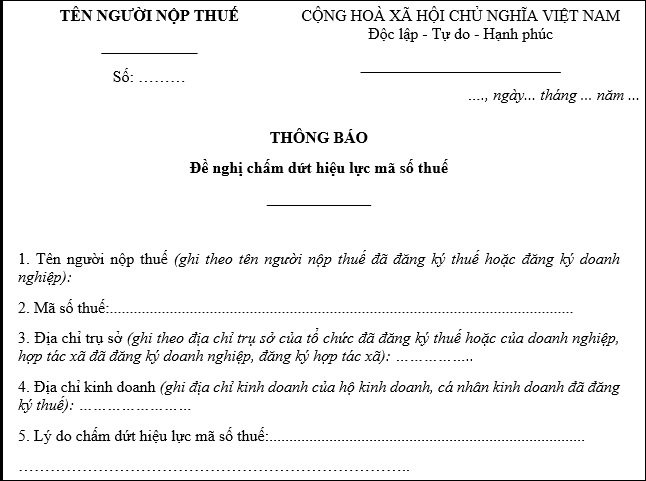In what cases must the tax code be invalidated?
1. In what cases must the tax code be invalidated?
Clauses 1 and 2, Article 39 of the Law on Tax Administration 2019 stipulates the cases in which taxpayers can have their tax codes invalidated, including:
- Taxpayers who register tax along with enterprise registration, cooperative registration, or business registration will have their tax code invalidated in one of the following cases:
+ Termination of business operations or dissolution or bankruptcy;
+ Revoked business registration certificate, cooperative registration certificate, business registration certificate;
+ Being divided, merged, consolidated.
- Taxpayers who register taxes directly with the tax authority will have their tax code invalidated in one of the following cases:
+ Terminate business activities, no longer incur tax obligations for non-business organizations;
+ Having the business registration certificate or equivalent license revoked;
+ Being divided, merged, consolidated;
+ The tax authority issues a notice that the taxpayer does not operate at the registered address;
+ Individuals die, go missing, or lose civil act capacity according to the provisions of law;
+ Foreign contractors at the end of the contract;
+ Contractors and investors participating in oil and gas contracts at the end of the contract or transferring all rights to participate in oil and gas contracts.
2. Obligations that taxpayers must complete before tax code termination

Pursuant to Article 15 of Circular 105/2020/TT-BTC stipulating the obligations taxpayers must complete before terminating their tax code as follows:
- For taxpayers as prescribed in Points a, b, c, d, dd, e, g, h, m, n, Clause 2, Article 4 of Circular 105/2020/TT-BTC:
+ The taxpayer submits a Report on invoice use in accordance with the law on invoices;
+ The taxpayer completes the obligation to submit tax declarations, pay taxes and handle overpaid tax amounts and non-deducted value added tax amounts (if any) according to the provisions of Articles 43, 44, 47, 60, 67, 68, 70, 71 Law on Tax Administration 2019 with tax administration agencies;
+ In case the managing unit has dependent units, all dependent units must complete the procedure to deactivate the tax code before terminating the tax code of the managing unit.
- For business households and individuals doing business as prescribed in Point i, Clause 2, Article 4 of Circular 105/2020/TT-BTC:
+ Taxpayers submit a report on the use of invoices according to the law on invoices if they use invoices;
+ The taxpayer completes the tax payment obligation and handles the overpaid tax amount according to the provisions of Articles 60, 67, 69, 70, 71 of the Law on Tax Administration 2019 with the tax administration agency for business households and business individuals people pay taxes using the flat tax method.
+ The taxpayer completes the obligation to submit tax declarations, pay taxes and handle overpaid tax amounts and non-deducted value added tax amounts (if any) according to the provisions of Articles 43, 44, 47, 60, 67, 68, 70, 71 Law on Tax Administration 2019 with tax administration agencies for business households and individual businesses that pay taxes according to the declaration method.
- For business households converted to small and medium enterprises according to the provisions of the Law on Support for Small and Medium Enterprises, the business household must complete its tax obligations with the directly managing tax agency or send a document to the agency. Tax commitment for small and medium-sized enterprises converted from business households to inherit all tax obligations of business households in accordance with the law on support for small and medium-sized enterprises.
- For individuals as prescribed in Points k and l, Clause 2, Article 4 of Circular 105/2020/TT-BTC:
The taxpayer completes the tax payment obligation and handles the overpaid tax amount according to the provisions of Articles 60, 67, 69, 70, 71 of the Law on Tax Administration 2019 with the tax administration agency.









